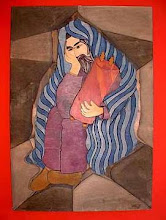The Truth About George Washington's Hanukkah
posted by Rabbi Susan Grossman
Categories: Jewish Holidays
For centuries, the lights of the Hanukkah menorah have inspired hope and courage. They may have also been responsible for inspiring then-General George Washington to forge on when everything looked bleak when his cold and hungry Continental Army camped at Valley Forge in the winter of 1777/8.
The story is told that Washington was walking among his troops when he saw one soldier sitting apart from the others, huddled over what looked like two tiny flames. Washington approached the soldier and asked him what he was doing. The soldier explained that he was a Jew and he had lit the candles celebrate Hanukkah, the festival commemorating the miraculous victory of his people so many centuries ago over the tyranny of a much better equipped and more powerful enemy who had sought to deny them their freedom. The soldier then expressed his confidence that just as, with the help of God, the Jews of ancient times were ultimately victorious, so too would they would be victorious in their just cause for freedom. Washington thanked the soldier and walked back to where the rest troops camped, warmed by the inspiration of those little flames and the knowledge that miracles are possible.
Different names have been suggested for the mysterious soldier, Jeremiah Greenman, Capt. Isaac Levy, or Private Asher Pollock of the Second Rhode Island Battalion, all of whom were at Valley Forge. Stephen Krensky, in his lovely children’s book, "Hanukkah at Valley Forge," traces the story back to a 1778 meeting Washington had at the home of Michael Hart, a Jewish merchant in Easton, Pa., which Hart’s daughter recorded in her diary, when Washington described his meeting with the Jewish soldier.
For me, what is most interesting is that while Hanukkah falls at different times during the year, in 1777, the first night of Hanukkah fell on Dec. 24, Christmas Eve.
George Washington's Continental Army arrived at Valley Forge just five days earlier, on Dec. 19. His choice of a site was sharply criticized. The troops were struggling to build enough huts before the men, barefoot and starving, died of exposure. Mutiny was in the air. One can only imagine what was going through General Washington'’s mind as he walked among the troops that night of Christmas Eve.
While some might question the veracity of the story, because the details of the Jewish soldier’s identity may be lost in time, here are its “truths:” Like generations of Jews before him, that soldier served as a “light unto the nations” (Isaiah 42:6), bringing inspiration and courage to a nation in its birth pangs. And he did so in a perfectly American way, a way in which a miracle did result, the miracle by which the light from one religion helps give comfort and courage to another.
It is just such religious tolerance and cooperation that the world needs so desperately today. The lights of Hanukkah remind us even in the darkest nights that miracles do happen.
Comments (6)
Filed Under: Army, George Washington, Hanukkah, Menorah, Miracles, War
Monday December 10, 2007
Happy Tu B'Shvat!
-
Wishing you a very Happy Tu B'Shvat! The New Year of the trees. It starts
tonight and is Monday, February 2nd this year. Also, traditionally, it is
when ...
56 minutes ago



















No comments:
Post a Comment